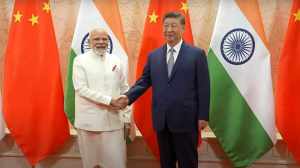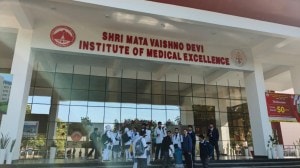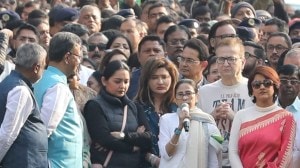Bypass and the beach
FROM Harley Street, London, a group of very business-like and inquisitive visitors from a medical service company recently came to Mumbai, l...

FROM Harley Street, London, a group of very business-like and inquisitive visitors from a medical service company recently came to Mumbai, list of doctors8217; appointments in hand.
The plan is under wraps but the strategy they propped up was clear 8212; how best to transfer patients on two-year National Health Services NHS waitlists in the UK to operating tables in Mumbai.
They sought one such private meeting to toss ideas with joint replacement surgeon Dr Arun Mullaji. Is surgery at Breach Candy and recovery at Marwe beach a marketable medical idea?
8216;8216;When travel agents take medical decisions,8217;8217; says Dr Mullaji cautiously, 8216;8216;it can boomerang.8217;8217; He lists glaring risks in medical tourism ventures: No legislations. No stringent guidelines. No official ratings for hospitals. 8216;8216;We shouldn8217;t end up with egg on our face. The Arabs have stopped coming since almost a decade, because they would often get ripped off.8217;8217;
But the medical mall is buzzing with activity.
Even as the Maharashtra government busies itself with plans to launch medical tourism 8212; a term most doctors cringe at 8212; from winter 2004, hospitals in the south have professionalised the perks package for the patient. MIOT Hospitals, Chennai, for instance, sends out a bus full of foreign patients and their attendants to nearby tourist spots and shopping malls every day at 4 pm. Apollo offers travel and accommodation assistance should recuperating patients wish to travel to Kerala or Karnataka. Both hospitals employ Arabic-speaking guest relations officers; MIOT even employs an Omani chef to take care of Middle-Eastern taste buds.
Beyond hospitals, the Taj Land8217;s End at Bandra has been offering special services to foreign guests seeking medical treatment or surgery for over a year. 8216;8216;We have customised packages for every foreign patient,8217;8217; says Karambir Kang, director, sales and marketing, Taj Mahal Palace and Tower, Mumbai. Like, a room with a view or a quiet room for recovery.
8216;8216;We have an informal tie-up with Asian Heart Institute and Lilavati Hospital,8217;8217; says Kang. 8216;8216;Patients are referred to Taj Land8217;s End, and get a choice of rooms, diet, better rates or extended stay benefits.8217;8217;
|
|
|
8216;We should not end up with egg on our face,8217; caution docs. 8216;Remember the Arabs who stopped coming after being cheated8217;
|
|
|
Cox and Kings India has a 2004 winter package chalked out for patients and next of kin. From a patient8217;s doorstep anywhere in the world to visa arrangement, airport pick-up, transport to hotel and hospital, they cover it all.
Post-recovery options are scenic: Take a pick from a Delhi hospital to Haridwar, Hrishikesh, Neemrana Fort or the Glass House on the Ganges. From surgery in Mumbai to a beach in Goa or Alibaug. From surgery in Chennai to sylvan Kerala.
8216;8216;We8217;ve discovered that warmth and hospitality of Indian doctors, even the medical officers and paramedics make a difference to foreign nationals,8217;8217; says Cox and Kings India director Arup Sen.
The plan is awaiting clearance from the international insurance community. An initial launch in India will cover over 20 hospitals in Delhi, Mumbai, Chennai, perhaps Bangalore too. 8216;8216;We can give value for money and cost saving for overseas nationals,8217;8217; says a confident Sen.
Travel major Thomas Cook admits only to 8216;8216;toying with the idea.8217;8217; We have to work out the liabilities and government regulations, says Ameeti Munshi, manager, corporate communications, Thomas Cook, Mumbai.
But need a second opinion? Go slow.
8216;8216;Middle-East patients would flock to India in the eighties,8217;8217; maintains infertility specialist Dr Aniruddha Malpani. 8216;8216;Because so many were cheat-ed, they now prefer to go elsewhere.8217;8217;
Meanwhile, the meetings continue. Cardiac surgeon and consultant at Lilavati Hospital Dr Pavan Kumar has had three foreign visitors to talk tie-ups. 8216;8216;They inquire about our medical equipment and standards,8217;8217; says Kumar. 8216;8216;They want medical advise how transfers can work.8221;
with in Chennai
- 01
- 02
- 03
- 04
- 05































